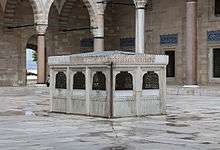Shadirvan

A fountain (şadırvan) for ritual ablutions in front of Hagia Sophia, Istanbul

Shadırvan of the Süleymaniye Mosque, Istanbul
Shadirvan (Turkish: şadırvan, Arabic: شاذروان) is a type of fountain that is usually built in the yard or entrance in front of mosques, caravanserais, khanqahs and madrasahs, with the main purpose of providing water for drinking or ritual ablutions to several people at the same time, but also as decorative visual or sound element.
Shadirvan is Persian in origin, and is a typical element of Ottoman architecture. Examples include Shadirvan square in Prizren, and the Band-e Kaisar Shadervan Bridge in Iran.
The term sadirvan may alternatively be spelt shadervan; shaderwan; şadervan; šadervan, šadrvan or šedrvan;[1][2][3] and Шадраван (shadravan).[4]
See also
- Sebil or sabil, public water fountain in Islamic countries
- Wudu, ritual purification in Islam
References
| Wikimedia Commons has media related to Shadirvans. |
- ↑ Hrvatski enciklopedijski rječnik, urednici Ranko Matasović, Ljiljana Jojić. Zagreb : Novi Liber, 2002. Str. 1272.
- ↑ http://www.knjiznica.hr/pitajte-knjiznicare/pretrazivanje/pitanje.php?pitanje=1545&target=%2Fpitajte-knjiznicare%2Fpretrazivanje%2Findex.php%3Fsearch_word%3D%26polje%3Dall%26offset%3D18619%26submit%3D
- ↑ Škaljić, A. Turcizmi u srpskohrvatskom jeziku. 6. izd. Sarajevo : Svjetlost, 1989. Str. 578.
- ↑ http://rechnik.info/%D1%88%D0%B0%D0%B4%D1%80%D0%B0%D0%B2%D0%B0%D0%BD
This article is issued from
Wikipedia.
The text is licensed under Creative Commons - Attribution - Sharealike.
Additional terms may apply for the media files.
-Jerusalem-Temple_Mount-Dome_of_the_Rock_(SE_exposure).jpg)